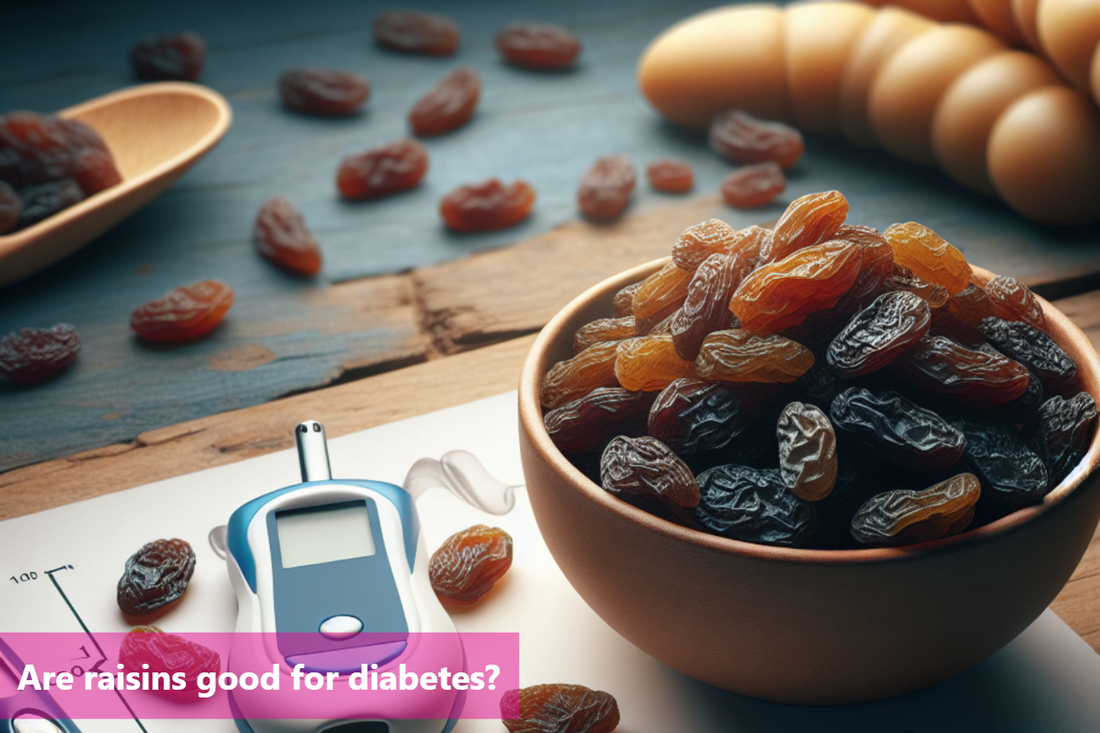Raisins, nature's little gems, are dried grapes bursting with sweetness. They are a popular snack but also offer a treasure trove of nutrients beneficial for our health. These wrinkled treats are packed with fiber, antioxidants, vitamin C, and potassium, making them a wholesome choice for anyone looking to enhance their diet.
Nutritional Benefits of Raisins
Raisins, particularly black raisins, are a nutritious snack that can offer various health benefits, including potentially being good for individuals managing diabetes. They are packed with essential nutrients that make them a valuable addition to a diabetic diet.
Nutrient |
Amount per 100g |
|---|---|
Calories |
299 kcal |
Carbohydrates |
79.2 g |
Dietary Fiber |
3.7 g |
Sugars |
59.2 g |
Protein |
3.1 g |
Fat |
0.5 g |
Vitamin C |
2.3 mg |
Vitamin K |
3.5 mcg |
Thiamine (Vitamin B1) |
0.106 mg |
Riboflavin (Vitamin B2) |
0.125 mg |
Niacin (Vitamin B3) |
0.766 mg |
Vitamin B6 |
0.174 mg |
Folate (Vitamin B9) |
5 mcg |
Pantothenic Acid (Vitamin B5) |
0.095 mg |
Calcium |
50 mg |
Iron |
1.88 mg |
Magnesium |
32 mg |
Phosphorus |
101 mg |
Potassium |
749 mg |
Sodium |
28 mg |
Zinc |
0.22 mg |
Copper |
0.318 mg |
Manganese |
0.299 mg |
Impact of Raisins on Blood Sugar Levels
Glycemic Index (GI): Raisins have a moderate to high glycemic index (GI), typically ranging from 55 to 65, causing a moderate increase in blood sugar levels.
Sugar Content: Raisins are naturally high in sugars, with about 59.2 grams of sugar per 100-gram serving.
Fiber Content: Despite being high in sugar, raisins also contain fiber, which can help slow down sugar absorption into the bloodstream. A 100-gram serving contains about 3.7 grams of fiber.
Portion Size: It's important to exercise portion control when consuming raisins to avoid a rapid increase in blood sugar levels. Stick to small serving sizes like a small handful or about 1/4 cup.
Combination with Other Foods: Pairing raisins with protein, healthy fats, and fiber can mitigate their impact on blood sugar levels. For example, adding raisins to a balanced meal with nuts, yogurt, or whole grain crackers can reduce the glycemic response.
Individual Factors: The impact of raisins on blood sugar levels varies based on factors like metabolism and insulin sensitivity. Individuals monitoring blood sugar levels should regularly test after consuming raisins.
Are Raisins a Recommended Snack for Diabetics?
Raisins can be included in a diabetic diet as a snack, but portion control and mindful consumption are crucial due to their high sugar content. Here are some considerations regarding whether raisins are a recommended snack for individuals with diabetes:
Glycemic Impact: Raisins have a moderate to high glycemic index (GI), which means they can cause a relatively rapid increase in blood sugar levels after consumption. For individuals with diabetes, this may necessitate careful portion control to avoid spikes in blood glucose levels.
Portion Size: While raisins can provide nutrients and energy, they are calorie-dense and high in natural sugars. It's important for individuals with diabetes to consume them in moderation and be mindful of portion sizes. A small serving of raisins, such as a small handful or about 1/4 cup, can be a suitable portion for a snack.
Combination with Other Foods: Pairing raisins with other foods that contain protein, healthy fats, and fiber can help mitigate their impact on blood sugar levels. For example, combining raisins with nuts or seeds can help slow down the absorption of sugar into the bloodstream and provide a more balanced snack option.
Overall Diet Composition: The inclusion of raisins as a snack should be part of an overall balanced diet that emphasizes whole foods, fruits, vegetables, lean proteins, and healthy fats. Individuals with diabetes should consider their total carbohydrate intake throughout the day and adjust portion sizes accordingly to maintain blood sugar control.
Blood Sugar Monitoring: It's essential for individuals with diabetes to monitor their blood sugar levels regularly, especially after consuming raisins or other carbohydrate-rich foods, to understand how their body responds. This can help inform portion sizes and dietary choices to maintain stable blood glucose levels.
Bottom Line
In simple terms, the discussion about how raisins are related to diabetes tells us important things. Raisins can be a good thing to eat for people with diabetes because they are sweet and have good nutrients. These dried grapes have a lot of fiber, vitamins, and minerals which can help control blood sugar levels. The fiber in raisins helps slow down how fast sugar gets into your blood, stopping sudden spikes in sugar levels. Also, vitamins and minerals in raisins keep you healthy, which is very important for people with diabetes.
Experts usually think that it's okay for diabetics to eat raisins as a snack, but not too much. Even though raisins have natural sugar, their fiber can balance out the effect on blood sugar levels. Black raisins, especially, might have more benefits because they have lots of antioxidants.
Adding raisins to a healthy diabetic diet can give you more nutrients without affecting blood sugar too much. Just make sure to watch how much you eat and how many carbohydrates you have to manage diabetes well.
This Blog post is an initiative by DiabeSmart, to provide accurate and Nutritionist / Doctor approved information related to Diabetes. DiabeSmart is India's first Food brand designed specifically for Diabetics, that has been clinically tested on Diabetics and Pre-Diabetics to deliver 55% - 70% lower Sugar spikes. DiabeSmart is part of Lo! Foods - India's leading brand for Everyday Functional Health foods.













